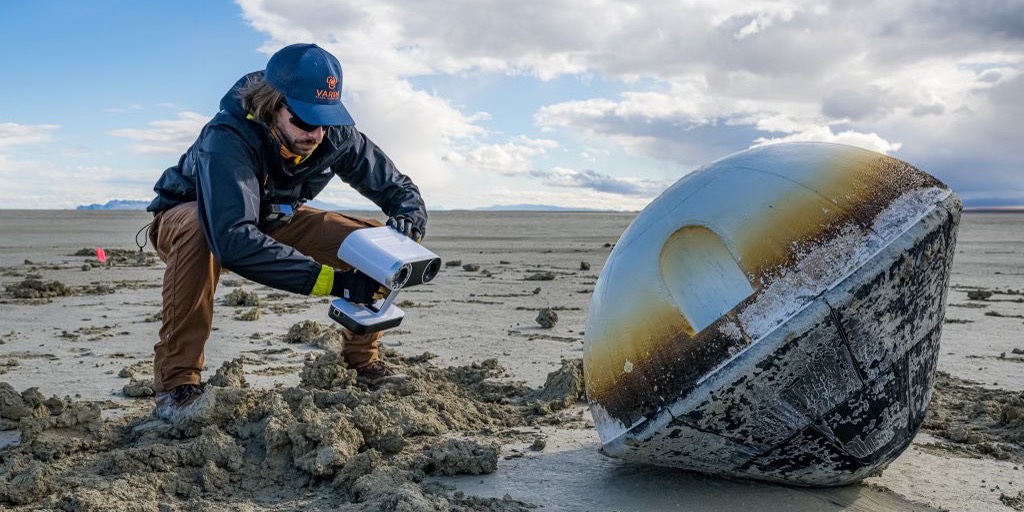
Varda Space Industries Inc., which specializes in in-space pharmaceutical manufacturing and hypersonic reentry technologies, is expanding its research and applications across multiple sectors. With innovations in microgravity-based drug development and reusable reentry systems, the company integrates space-based manufacturing processes with scalable solutions for defense and industrial applications.
The company recently completed a successful mission to manufacture pharmaceuticals in low Earth orbit. In February 2024, its W-1 spacecraft produced a metastable Form III of ritonavir, an antiretroviral drug used to treat HIV.
The crystallization process utilized the unique microgravity environment, which alters molecular kinetics and enables outcomes difficult to achieve on Earth. The ritonavir payload was returned to Earth intact, with the capsule surviving reentry at hypersonic speeds exceeding 18,000 miles per hour. Thermal protection materials developed by NASA, known as Conformal Phenolic Impregnated Carbon Ablator, ensured the capsule’s integrity during atmospheric descent.
Hypersonic testing and defense applications
Varda’s spacecraft are modular and designed to serve a variety of purposes, including hypersonic testing. Through a $48 million, four-year contract with the U.S. Air Force Research Laboratory, Varda’s W-Series reentry capsules are being adapted to evaluate vehicle subsystems in real-flight environments.
Hypersonic testing traditionally relies on experimental aircraft, which are expensive and difficult to scale. By using reusable reentry systems, Varda’s approach offers an alternative that enables payload testing under controlled yet operational conditions.
The upcoming W-2 mission, scheduled for early 2025, will demonstrate these capabilities by carrying a spectrometer for the Air Force Research Laboratory called Optical Sensing of Plasmas in the Reentry Environment, or OSPREE. The payload will collect atmospheric descent data to refine thermal protection materials, sensor systems, and aerodynamic designs for hypersonic vehicles.
Microgravity research and pharmaceutical processing
The ability to process materials in microgravity allows for enhanced control over molecular behavior and kinetics. Varda’s orbital manufacturing platform enables experiments that address challenges in pharmaceutical development, including improving stability and solubility in drug formulations. During its first mission, Varda successfully produced ritonavir in a metastable form not commonly achievable on Earth.
The company’s research extends beyond microgravity, with a hypergravity platform designed to investigate the effects of varying gravitational forces on nucleation and crystal growth. Recent studies have shown how gravity can be used as a variable to refine particle size distributions in
small-molecule therapeutics. These findings are contributing to new approaches in drug design and production.
At the American Institute of Chemical Engineers and the American Association of Pharmaceutical Scientists annual meetings earlier this year, Varda researchers presented their findings on gravity’s influence on material properties. Collaborators such as Improved Pharma are contributing additional research on the chemical and physical stability of the ritonavir samples returned from space.
Reentry systems and industrial applications
Varda’s spacecraft are modular by design, making them adaptable to a wide range of missions, from pharmaceutical manufacturing to defense-related hypersonic testing. The reentry capsules provide a reusable platform for returning materials to Earth or exposing payloads to atmospheric reentry conditions. By refining its operations, Varda aims to establish consistent launch and return capabilities to support industrial partners seeking access to space-based research and manufacturing.
The use of modular systems has the potential to scale applications for industries requiring rapid testing or production in low Earth orbit. These developments are providing new tools for addressing challenges in aerospace, materials science, and pharmaceuticals, with implications for both space and terrestrial industries.
FTC: We use income earning auto affiliate links. More.



Comments